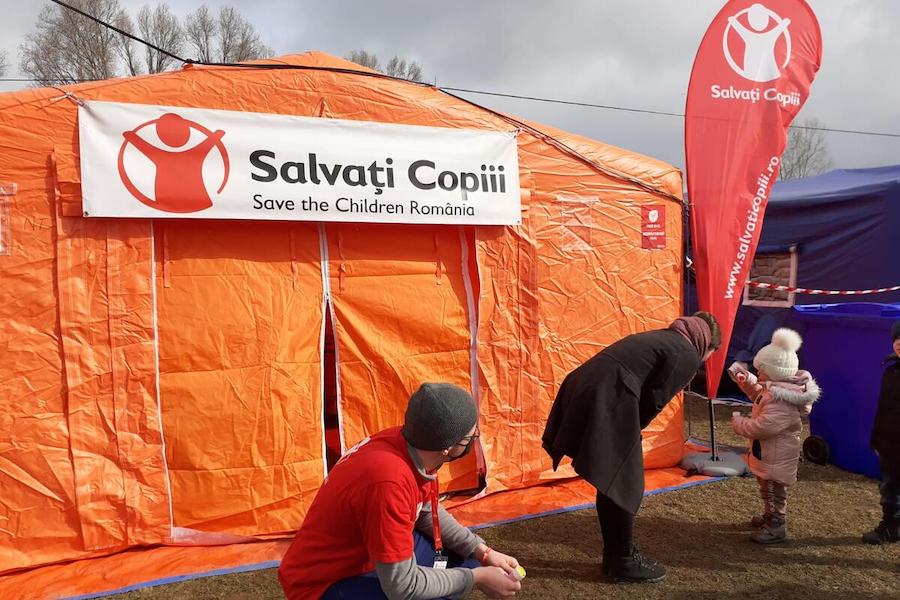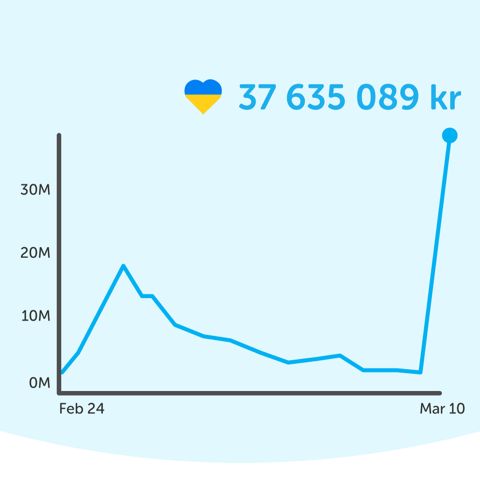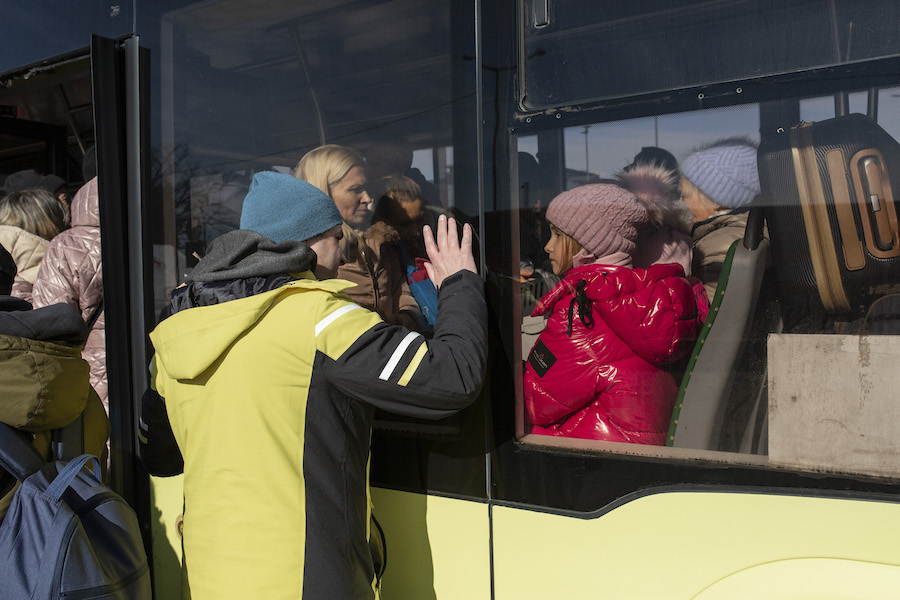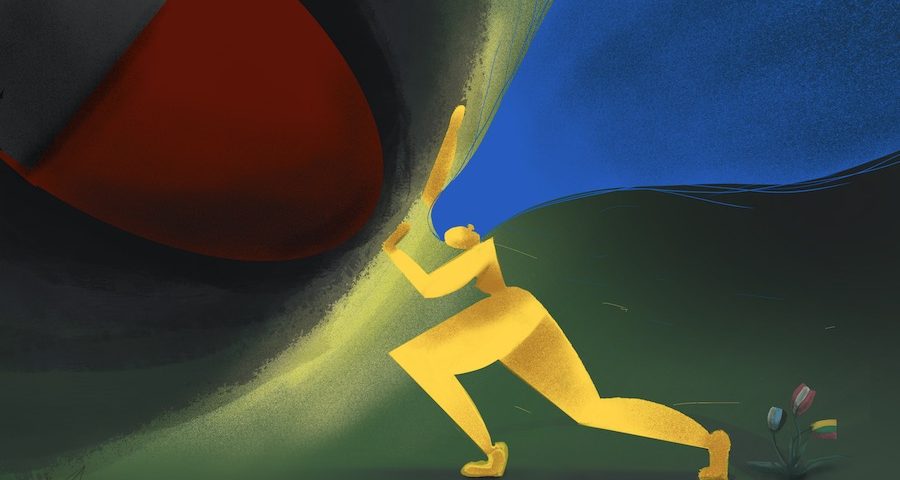
Matt Smith: Demystifying the crypto-philanthropic opportunity
March 16, 2022
Corentin Hue: Is Google Analytics on its way out?
March 24, 2022The current European nonprofit landscape is dominated by Putin’s invasion of Ukraine and the evolving humanitarian crisis. What does this mean for the fundraising community and how are organisations channelling funding where the need is greatest? In this feature, we look at some of the ways nonprofits are responding and explore some initial trends.
As Ukraine’s cities continue to come under fire from heavy artillery and men and women pick up arms to defend their nation, Europe is preparing for the largest displacement of people in Europe since the Second World War – a refugee crisis of mass proportions.
The UN estimates that 18 million people will be impacted by the escalating conflict and up to four million Ukrainians may be forced to leave their country. Already, at the time of writing, almost three million people are reported to have fled across national borders. And, as the situation evolves, the EU believes that the total number of refugees could climb to seven million.
Governments, corporates, nonprofits and the public are coming together to respond to the crisis. And at the heart of the international aid movement, nonprofits are raising huge sums of funding for food, shelter and emergency supplies, providing first aid, transporting sick and injured people to safety and so much more.
Due to the scale of the crisis, NGOs in Ukraine and internationally are having to use all their means to channel support swiftly where humanitarian need is greatest. The impact on the nonprofit community in the region is immense, with Tony Myers – the Canadian fundraising and leadership specialist, saying: “The pivot for wartime fundraisers pales in comparison to any pivoting we went through during the last two years of the pandemic.”

A new Child Friendly space set up by Save the Children across the Romanian border. Copyright Save the Children.
Channelling support fast and at scale
Almost immediately after the invasion, a flurry of appeals launched from many of the well-known international NGOs (including the Red Cross, Save the Children and Oxfam), alongside smaller, niche organisations too. These include Soleterre in Italy, working to rescue Ukrainian children with cancer, a joint appeal from Cystic Fibrosis Europe and the European Cystic Fibrosis Society to support Ukrainians with the disorder, and PETA Germany, which has since rescued more than 500 animals in Ukraine, taking them across the border to safety.
Having recently sought sanctuary in Poland, Svitlana Kuts, director of the Ukrainian Institute of Professional Fundraising, says: “Ukrainian nonprofits and international aid agencies have become more visible than ever, with volunteers serving at evacuation points and helping each other to safety. There’s a huge drive for support, and an overwhelming sense among the Ukrainian people that we are all in this together.”
She adds: “NGOs are organising campaigns to raise as much support as possible to meet humanitarian need, but often grant funding from international sources takes time and paperwork – too much time when the situation requires urgency. As a result, some NGO founders are spending their own money to fund immediate aid and people are even donating directly to the accounts of relied and trusted volunteers and foundations.”
Among the most collaborative initiatives, Support Ukraine Now is a regularly updated crowdfunded site supported by the Cabinet of Ministers of Ukraine. The site summarises the different ways people can help, from donating money to sending humanitarian supplies, hosting and hiring Ukrainians, and more.
Kuts highlights that one foundation, Come Back Alive, has become a vital part of Ukraine’s defence infrastructure, building trust through its transparent reporting structures. Launched when Russia invaded Crimea in 2014, the foundation raises funds to equip the nation’s armed forces with technology, training and ammunition. Donations can be made as card payments, through Swift or cryptocurrencies, and can be given tax-free. The foundation operates with an open reporting system, meaning that donors can see where funds have been spent, strengthening their connection with the cause.
With the world having flocked to digital channels during the pandemic, it’s no surprise perhaps that social media, crowdfunding sites, online and mobile giving have all played a key role in enabling people to respond quickly. Facebook has been widely used by fundraisers in Central and Eastern Europe, particularly in Poland, which was one of the first nations in the region to introduce the ‘Donate’ button. Meanwhile a TV4 fundraising gala in Sweden raised around €3.5 million for aid organisations working in Ukraine and – at its peak – recorded more than 100 payments per second via Swish (a Swedish mobile payment system).

Crypto giving on the rise
Crypto donations, which enable transparent and real time reporting, have become instrumental in channelling funds through to humanitarian aid in Ukraine. From Come Back Alive to Razom for Ukraine and the Dobrobut Foundation, nonprofits within and beyond the country are increasingly calling for donations to be given through cryptocurrencies. (See this list of ‘verified’ organisations.)
Even the Ukrainian government took the unexpected step of tweeting its crypto wallet codes and issuing a call for support – an initiative that has prompted gifts amounting to almost $50 million since the start of the Russian invasion.
But perhaps the best known cryptophilanthropy platform is The Giving Block, which enables the public to choose from over 1,000 charity recipients worldwide. Having launched its Ukraine Emergency Response Fund in partnership with 27 international aid organisations, The Giving Block recently announced that fund has already raised over $1.5 million and that number continues to climb.
While crypto giving is not without its risks (explained further in Matt Smith’s blog), it’s proving increasingly popular with supporters, particularly when it comes to savvy Millennial investors. In fact, according to Fidelity Charitable in the US, one third of crypto investors donate digital assets to good causes. And certainly, when it comes to supporting Ukraine, crypto giving is playing a fundamental role.
Collaborating with match funding to maximise impact
At a time where there is so much need and so many calls for help, the option for donors to support a collective campaign can be all the more appealing.
In its first four days alone, the UK’s Disasters Emergency Committee (DEC) raised £100 million (€119 million) through its Ukraine Humanitarian Appeal, which draws together 13 leading aid organisations. This equates to more than £1m an hour from launch.
Almost £3 million was donated to the DEC’s appeal through the matched giving platform, the Big Give, which serves as a further incentive in enabling people to double the value of their donations to Ukraine. Almost 9,000 people have chosen to give in this way, with match funding provided by the UK Government’s Aid Match scheme and The Reed Foundation.
Describing the platform as a ‘generosity multiplier’, James Reed, chair of the Big Give, highlights the strength of the scheme in empowering donors to double their impact, saying: “The public has been incredible in the wake of this terrible crisis.”
Upscaling NGOs support in neighbouring nations
With more than half of Ukrainian refugees currently fleeing to Poland (1.85 million to date), and the Moldovan population reportedly swelling by over 4% in these few weeks since the invasion, NGOs in Ukraine’s neighbouring nations are now on the front line of a migration crisis.
Marcin Chmielowski, director of the Polish Fundraising Association, says: “In Poland, people have been hugely welcoming, donating generously and members of the Polish Fundraising Association are enormously involved in aid activities.
“As it stands, Polish NGOs are holding up pretty well and this is largely due to having pre-existing infrastructure in place, with reliable and experienced people. The Polish Humanitarian Action, for example, has been carrying out aid activities in Ukraine for some time, so the organisation understands the issues and how best to help.
“But there’s no doubt that this is a serious test of our organisational skills and ability to upscale our services, with such a mass influx of people in less than three weeks. If the Russian attack continues, the number of Ukrainian refugees in Poland will increase and make it even more difficult for us to provide the support needed. What we need now is systemic solutions that will enable us to grow and meet those needs as they evolve.”
Looking to the future, Chmielowski adds: “Fundraising has been critical during this time and Poles are becoming more used to donating. This will surely influence future appeals beyond the attack on Ukraine. However, we will need to convince supporters that giving is not only a short-term or emergency response – it can be longer-term.”

A father says farewell to his family as they are separated at the Lviv bus station. Copyright UNHCR.
Strategic focus and collaboration
Strategic and systemic support will, of course, be essential for organisations that are developing solutions for the challenges that lie ahead – be that employment, education or the broader integration of Ukrainian citizens in welcoming societies.
With a focus on the longer-term challenges that are too big for any single organisation to address, the Social Impact Alliance for Central & Eastern Europe has developed a dedicated fund to initiate and coordinate collective action among nonprofits, business and academia.
The Alliance’s founder, Anna Korzeniewska, says: “As this conflict may escalate into a long-term humanitarian crisis, cooperation as well as preparing nonprofits’ staff to secure financial sustainability of their organisations are critical, especially in the areas of fundraising, management, technology and communication.”
Through its re-granting programme, the Strong Civil Society Fund will award unrestricted grants to carefully selected or created coalitions, to work on strategic solutions to long-term challenges resulting from the crisis. This includes a new work programme for the education and integration of Ukrainian children in Poland.
Korzeniewska adds: “We believe that only through strengthening the region’s impact ecosystem, can we build resilient nations, capable of dealing with threats to peace, democracy and the rule of law.”
Right now, as the invasion continues, it’s the immediate humanitarian impact that remains front of mind. The Ukrainian spirit appears stronger than ever, inspiring immense support from across the globe and there is an overwhelming sense of unity from nonprofits, as they stand in solidarity with the Ukrainian people.
Main image by Miglė Kartanaitė, Creatives for Ukraine




